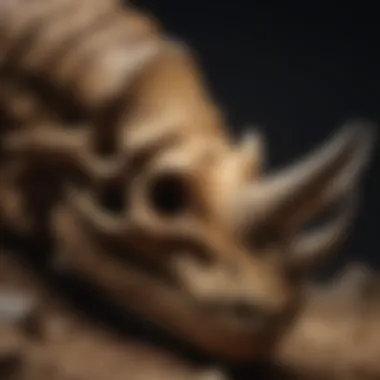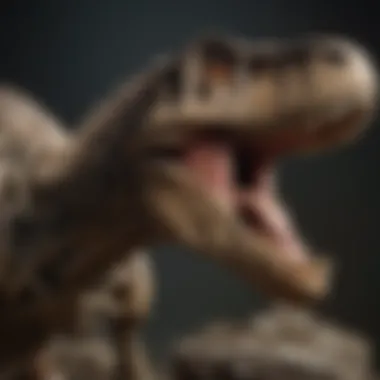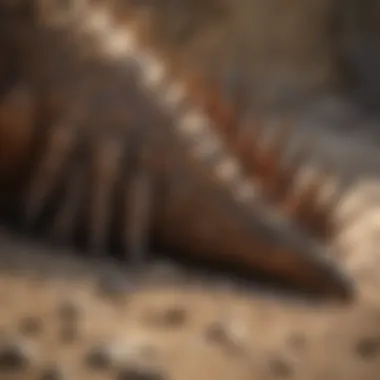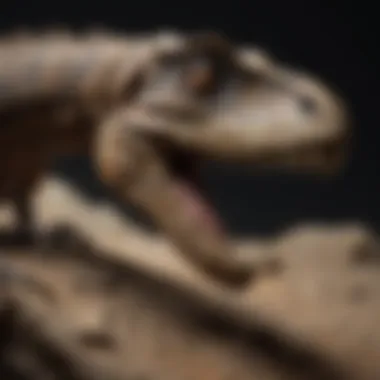Unearthing the Enigmatic: A Deep Dive into Dinosaur Bone Kits


Rock and Fossil Identification
In the realm of paleontology and geological exploration, understanding the nuances of rock and fossil identification is paramount. Various types of rocks and fossils present themselves in different forms, ranging from sedimentary to metamorphic. It is crucial for aspiring enthusiasts to familiarize themselves with the characteristics that distinguish each type, such as texture, color, and composition. Tools play a vital role in this process, with magnifying lenses, chisels, and brushes aiding in the intricate examination and identification of rocks and fossils.
Collecting Tips and Techniques
Embarking on the journey of collecting rocks and fossils requires meticulous planning and adherence to best practices. To optimize the collecting experience, individuals should research and locate prime sites known for their abundant fossil remains. Once on-site, it is essential to employ safe and effective techniques for extracting specimens, utilizing tools like rock hammers and shovels with precision. By following proper collection protocols and respecting the environment, collectors can enhance their chances of discovering rare and well-preserved fossils.
Preservation and Display
After the exhilarating process of collecting rocks and fossils, attention must turn to their preservation and display. Various techniques, such as consolidating fragile specimens with adhesives and storing them in controlled environments, ensure the longevity of these geological wonders. Proper storage methods, including acid-free containers and silica gel packets for moisture control, safeguard the integrity of the collection. Furthermore, creativity can shine in the realm of display, with options ranging from elegant glass cases to interactive museum-style setups, amplifying the aesthetic appeal and educational value of the exhibited fossils.
Geological Insights
Delving deeper into the geological facets of rock and fossil collections unveils a treasure trove of insights. Geological formations and processes provide a window into the Earth's transformative history, showcasing the dynamic forces that have shaped our planet over millennia. The historical significance of rocks and fossils extends beyond mere artifacts, offering glimpses into ancient ecosystems and evolutionary milestones. Notable discoveries in the field continue to reshape our understanding of the past, with each find enriching the tapestry of geological knowledge and fueling the passion of rock and fossil collectors worldwide.
Introduction to Dinosaur Bone Kits
What are Dinosaur Bone Kits?
Composition of Dinosaur Bone Kits
Delving into the composition of dinosaur bone kits reveals a meticulous arrangement of replica bones meticulously crafted to mimic the appearance and texture of genuine fossils. These kits typically include a variety of bones, such as femurs, skulls, ribs, and claws, meticulously designed to resemble those of different dinosaur species. This attention to detail not only adds to the educational value of the kits but also enhances the overall immersive experience for collectors. The composition of dinosaur bone kits plays a crucial role in providing enthusiasts with a realistic and engaging exploration of paleontology.
Types of Dinosaur Bones Included
The diversity of dinosaur bones included in these kits serves to offer collectors a comprehensive view of various dinosaur species. From the colossal Tyrannosaurus Rex to the swift Velociraptor, each kit typically contains a range of bones representing different dinosaurs. This variety not only enriches the educational experience by enabling enthusiasts to identify and compare distinct bone structures but also fuels curiosity and a deeper appreciation for the diversity of prehistoric fauna. The inclusion of various types of dinosaur bones in these kits amplifies the learning potential and fosters a deeper understanding of paleontological concepts.
Importance of Dinosaur Bones


Scientific Value
Dinosaur bones hold immense scientific value as they provide valuable insights into the anatomy, behavior, and evolution of these ancient creatures. By studying fossilized bones, scientists can reconstruct the past ecosystems, understand evolutionary relationships, and even hypothesize about locomotion and feeding habits of dinosaurs. The scientific value of dinosaur bones extends beyond mere curiosity, serving as critical pieces in the puzzle of Earth's evolutionary history. Embracing the scientific worth of dinosaur bones illuminates the significance of preserving these fossils for future generations of researchers and enthusiasts.
Educational Significance
The educational significance of dinosaur bones lies in their ability to captivate and educate individuals of all ages. For budding paleontologists and curious minds alike, dinosaur bones offer a tangible link to the past, enabling hands-on learning experiences that spark fascination and curiosity. Through interactive exploration of dinosaur bone kits, enthusiasts can engage in STEM learning opportunities, develop critical thinking skills, and deepen their understanding of paleontological principles. The educational significance of dinosaur bones extends far beyond mere artifacts, inspiring a lifelong passion for discovery and scientific inquiry.
Evolution of Dinosaur Bone Kits
History of Dinosaur Bone Kits
The evolution of dinosaur bone kits traces back to their humble beginnings as basic replicas of fossilized bones. Over time, these kits have undergone significant developments, incorporating scientific accuracy, enhanced detailing, and improved materials to provide a more authentic experience. From rudimentary representations to intricately crafted models, the history of dinosaur bone kits reflects advancements in paleontological knowledge and technological expertise. Exploring the history of dinosaur bone kits unveils a fascinating journey of innovation and refinement within the realm of paleontological education.
Technological Advancements
Technological advancements have revolutionized the landscape of dinosaur bone kits, offering cutting-edge tools and resources for aspiring paleontologists and collectors. The integration of 3D printing technology has enabled the creation of highly detailed and accurate replicas of dinosaur bones, allowing for a more immersive and realistic exploration experience. Additionally, interactive digital platforms now complement physical kits, providing supplementary learning resources and virtual excavation simulations. Embracing technological advancements in dinosaur bone kits not only enhances the educational value of these tools but also ensures that enthusiasts stay abreast of the latest developments in paleontological research and exploration.
Acquiring a Dinosaur Bone Kit
In the realm of paleontology and fossil collection, the process of acquiring a dinosaur bone kit holds vital importance. As enthusiasts and collectors delve into the intriguing world of prehistoric artifacts, the journey begins with selecting the right kit. Understanding the significance of this step is paramount to embarking on a fulfilling paleontological experience. Acquiring a dinosaur bone kit not only provides hands-on learning opportunities but also serves as a gateway to unraveling the mysteries of ancient life forms. The careful consideration and selection process can greatly enhance the overall satisfaction and educational value of the kit.
Choosing the Right Kit
Factors to Consider
When deciding on the most suitable dinosaur bone kit, various factors come into play. Factors such as the authenticity of the bones, the complexity of the assembly process, and the educational resources included can significantly impact the overall experience. By carefully evaluating these aspects, collectors can ensure they choose a kit that aligns with their preferences and objectives. Factors to consider also extend to the quality of materials used, the accuracy of bone replicas, and the level of detail present in the kit. This attention to detail enhances the realism and educational value of the kit, making it a valuable addition to any collection.
Popular Brands


Certain brands have established themselves as leaders in the dinosaur bone kit market due to their commitment to quality and innovation. These brands offer a wide range of kits catering to different skill levels and interests, providing collectors with abundant choices. The popularity of these brands stems from their reliability, efficiency in packaging, and dedication to accuracy in recreating dinosaur bones. Choosing a kit from a reputable brand ensures a level of quality and authenticity that enriches the overall paleontological experience.
Where to Purchase
Physical Stores vs. Online Retailers
The decision of where to purchase a dinosaur bone kit is a significant one for collectors. Physical stores present the advantage of allowing customers to examine potential purchases in person, assessing the quality and authenticity firsthand. On the other hand, online retailers offer convenience and a broader selection, allowing collectors access to a variety of kits from different brands and manufacturers. Each purchasing option presents unique benefits and considerations, and the choice ultimately depends on the collector's preferences and priorities.
Authenticity and Quality
Authenticity and quality are paramount considerations when purchasing a dinosaur bone kit. Ensuring the bones are authentically replicated and made from high-quality materials guarantees a more realistic and engaging experience. Kits that uphold standards of authenticity and quality provide collectors with a valuable opportunity to immerse themselves in the world of paleontology, fostering a deeper appreciation for these ancient specimens.
Cost Factors
Investment Value
Investing in a high-quality dinosaur bone kit can yield long-term value for collectors. Kits that offer intricate details, accurate replicas, and ample educational resources hold their value over time, becoming cherished pieces in a collection. The investment value of a kit extends beyond monetary worth to the educational and experiential significance it offers, making it a worthwhile addition to any fossil enthusiast's repertoire.
Budget-Friendly Options
For collectors looking to start or expand their fossil collection without breaking the bank, budget-friendly options provide an accessible entry point. These kits offer a balance between affordability and quality, allowing enthusiasts to engage in paleontological exploration without significant financial investment. Budget-friendly options often feature basic assembly processes and essential educational materials, making them ideal for beginners or casual collectors seeking a cost-effective way to delve into the world of dinosaurs.
Assembling and Exploring Your Dinosaur Bone Kit
In the realm of paleontology enthusiasts, assembling and exploring a dinosaur bone kit is a pivotal experience. Within the context of this comprehensive guide to dinosaur bone kits, diving deep into the process of assembling and exploring these kits brings forth a plethora of benefits. The hands-on nature of assembling a kit provides a unique insight into the world of dinosaurs and paleontology, allowing enthusiasts to connect with these ancient creatures on a tangible level. Exploring the contents of a dinosaur bone kit not only offers a thrilling adventure but also fosters a deeper understanding of geological history and the significance of fossil remains.
Step-by-Step Assembly Guide
Tools Provided


Delving into the tools provided within a dinosaur bone kit reveals an array of instrumental elements that enrich the exploration experience. These tools, ranging from brushes and chisels to magnifying glasses and detailed instructions, are curated to assist enthusiasts in excavating and handling the delicate fossil replicas effectively. The key characteristic of these tools lies in their durability and precision, enabling individuals to uncover and handle dinosaur bones with care and accuracy. The unique feature of these tools is their educational value, as they not only aid in assembling the kit but also in developing essential skills in observation and scientific methodology. While the tools enhance the overall assembly process, careful consideration of their advantages, such as promoting attention to detail and fostering a meticulous approach, solidifies their importance in this article.
Techniques for Preservation
Understanding the techniques for preservation provided in a dinosaur bone kit is crucial for maintaining the integrity and longevity of the fossil replicas. These preservation techniques, which include storing the bones in a cool and dry environment, using archival materials, and avoiding direct sunlight exposure, play a significant role in safeguarding the specimens. The key characteristic of these techniques lies in their ability to prevent degradation and ensure the continued quality of the fossil replicas. By integrating these preservation methods into the assembly process, enthusiasts can effectively contribute to the longevity and authenticity of their collection. The unique feature of these preservation techniques is their practicality, offering a user-friendly approach to conserving dinosaur bones without compromising on the educational value of the kit. While these techniques present clear advantages in safeguarding the specimens, understanding their limitations, such as the need for periodic maintenance and monitoring, is essential for maximizing their effectiveness in preserving dinosaur bones within the context of this article.
Preserving and Displaying Dinosaur Bones
Long-Term Preservation Techniques
Storage Tips:
Discussing Storage Tips is paramount in the context of preserving dinosaur bones effectively. Proper storage techniques play a critical role in maintaining the integrity of fossils. By storing them in appropriate conditions, such as controlled humidity and temperature, we can prevent degradation and extend their lifespan. Sturdy storage containers, archival tissue papers, and avoiding direct sunlight are key features of efficient storage tips. These techniques safeguard the specimens from environmental factors that could compromise their structural composition and historical significance.
Preventing Degradation:
Preventing degradation is essential for the long-term preservation of dinosaur bones. Various methods, such as applying consolidants to fragile specimens or using protective coatings, help mitigate degradation risks. By addressing vulnerabilities like exposure to moisture or pests, the prevention of degradation ensures that the fossils remain intact and informative for future study. While protective measures like coatings can shield bones from environmental harm, they might alter their appearance or chemical composition. Balancing these advantages and disadvantages is critical in selecting the most suitable degradation prevention strategies for optimal preservation.
Showcasing Your Collection
Display Options:
When it comes to showcasing your collection, choosing the right display options is key. Display cases with adjustable lighting and customizable shelves elevate the presentation of dinosaur bones. The transparency of glass cases allows for clear visibility while protecting the specimens from dust and physical damage. Additionally, incorporating informational labels enhances the educational aspect of displays. The versatility and durability of display options make them a popular choice for enthusiasts looking to highlight their collections effectively.
DIY Display Ideas:
DIY display ideas provide a creative and personalized approach to showcasing dinosaur bones. From constructing replica excavation sites to crafting interactive displays, DIY projects add a unique touch to collection exhibitions. Utilizing reclaimed wood for shelves or creating themed displays based on eras can offer a distinctive visual appeal. While DIY display ideas require time and effort, they afford collectors the opportunity to tailor their exhibits to reflect personal preferences and interests, enriching the viewing experience for visitors.
Sharing Your Passion
Engaging with Fellow Collectors:
Engaging with fellow collectors fosters a sense of community and shared enthusiasm for paleontology. From attending fossil fairs to participating in online forums, interacting with like-minded individuals offers valuable insights and networking opportunities. Sharing knowledge, experiences, and discoveries enhances the passion for collecting and allows for collaborative learning. Engaging with fellow collectors cultivates a supportive environment where enthusiasts can exchange ideas and appreciation for the scientific and aesthetic value of dinosaur bones.
Contributing to Scientific Research:
Contributing to scientific research through the study and documentation of collected specimens elevates the significance of fossil collecting. By collaborating with researchers or museums, collectors can contribute valuable data for scientific analysis and publication. Participating in citizen science projects or volunteer programs provides avenues for enthusiasts to make meaningful contributions to paleontological research. While contributing to scientific research requires dedication and meticulous record-keeping, the impact of such involvement extends beyond individual collections, enriching the broader understanding of prehistoric life and Earth's history.







